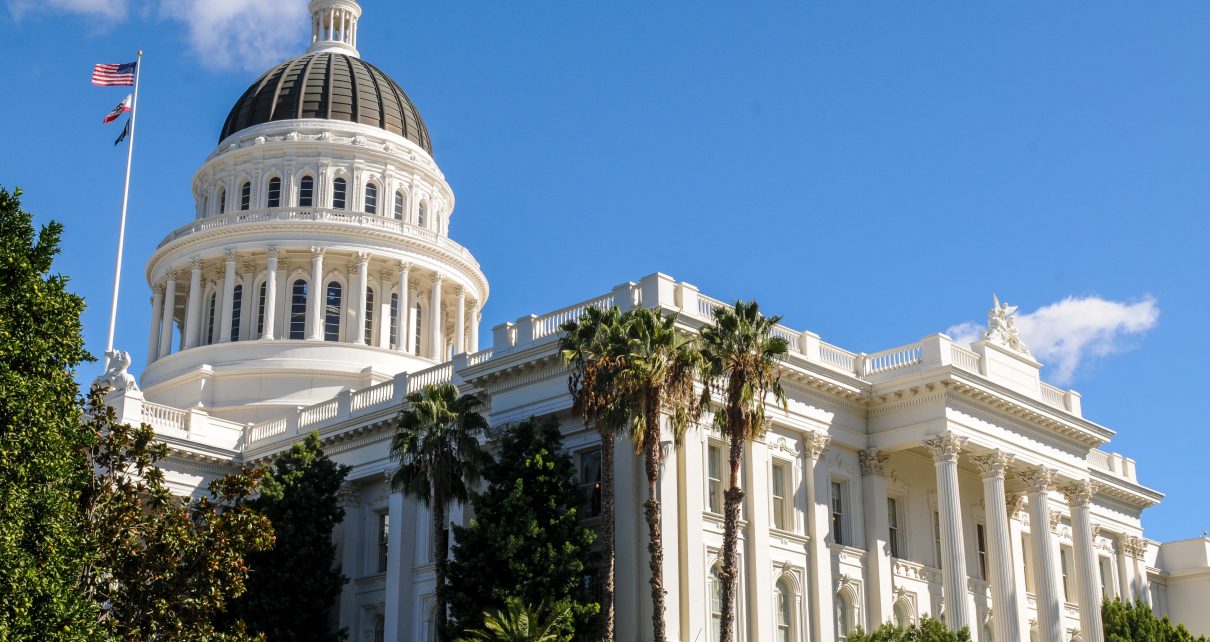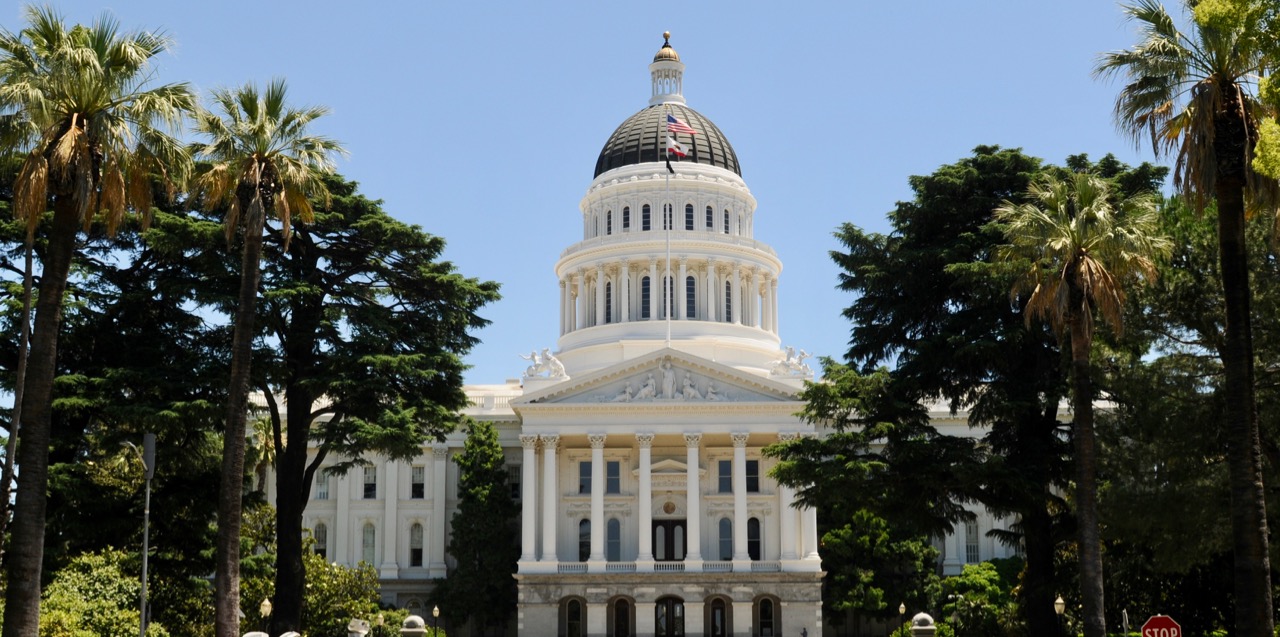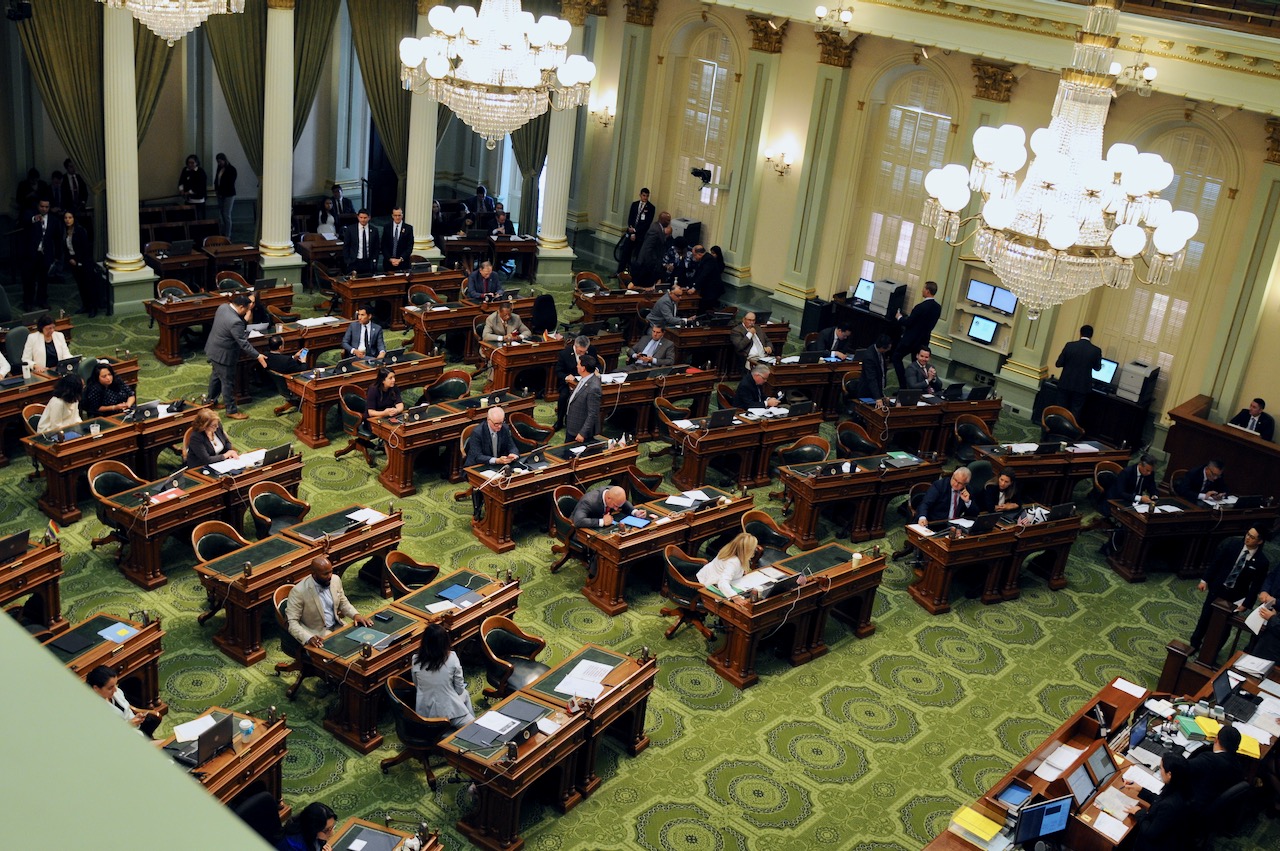
California State Capitol. (Photo: Kevin Sanders for California Globe)
Meetings of California State Agencies
A state body is prohibited from restricting the broadcast of its open and public meetings
By Chris Micheli, October 7, 2024 7:27 am
Section 11120 expresses the public policy of this state that public agencies exist to aid in the conduct of the people’s business and the proceedings of public agencies be conducted openly so that the public may remain informed. In enacting this article, the Legislature finds and declares that it is the intent of the law that actions of state agencies be taken openly and that their deliberation be conducted openly. This article is known and may be cited as the Bagley-Keene Open Meeting Act.
Section 11121 defines the term “state body” to include five different types of entities. Section 11121.1 states that the term “state body” does not include six specified entities. Section 11121.9 requires each state body to provide a copy of this article to each member of the state body upon his or her appointment to membership or assumption of office.
Section 11121.95 provides that any person appointed or elected to serve as a member of a state body who has not yet assumed the duties of office must conform his or her conduct to the requirements of this article and be treated for purposes of this article as if he or she has already assumed office.
Section 11122 defines the term “action taken.” Section 11122.5 defines the term “meeting.”
Section 11123 requires all meetings of a state body to be open and public and all persons are permitted to attend any meeting of a state body, except as otherwise provided in this article. This article does not prohibit a state body from holding an open or closed meeting by teleconference for the benefit of the public and state body.
However, the meeting or proceeding held by teleconference must comply with all applicable requirements or laws relating to a specific type of meeting or proceeding, including six specified instances. The term “teleconference” is defined. The state body is required to publicly report any action taken and the vote or abstention on that action of each member present for the action.
Section 11123.1 requires all meetings of a state body that are open and public to meet the protections and prohibitions contained the Americans with Disabilities Act of 1990 and the federal rules and regulations adopted in implementation of the Act.
Section 11123.5 states that any state body that is an advisory board, advisory commission, advisory committee, advisory subcommittee, or similar multimember advisory body may hold an open meeting by teleconference as described in this section, provided the meeting complies with all of the section’s requirements. There are numerous provisions related to participating in a teleconference meeting from a remote location in this section.
In addition, the following terms are defined in this section: “participate remotely,” “remote location,” and “teleconference.” This section does not limit or affect the ability of a state body to hold a teleconference meeting under another provision of this article. This section becomes operative on January 1, 2026.
Section 11124 prohibits any person from being required, as a condition to attendance at a meeting of a state body, to register their name, to provide other information, to complete a questionnaire, or otherwise to fulfill any condition precedent to their attendance. However, this section does not apply to an internet website or other online platform that may require the submission of information to log into a teleconferenced meeting, provided, however, that a person could use anonymous information when using the internet website or other online platform to attend the meeting.
Section 11124.1 states that any person attending an open and public meeting of the state body has the right to record the proceedings with an audio or video recorder or a still or motion picture camera in the absence of a reasonable finding by the state body that the recording cannot continue without noise, illumination, or obstruction of view that constitutes, or would constitute, a persistent disruption of the proceedings.
A state body is prohibited from restricting the broadcast of its open and public meetings in the absence of a reasonable finding that the broadcast cannot be accomplished without noise, illumination, or obstruction of view that would constitute a persistent disruption of the proceedings.
Section 11125 requires the state body to provide notice of its meeting to any person who requests that notice in writing. Notice must be given and also made available on the Internet at least 10 days in advance of the meeting, and include the name, address, and telephone number of any person who can provide further information prior to the meeting, but need not include a list of witnesses expected to appear at the meeting.
In addition, the notice of a meeting of a body that is a state body includes a specific agenda for the meeting, containing a brief description of the items of business to be transacted or discussed in either open or closed session. A brief general description of an item generally need not exceed 20 words. A description of an item to be transacted or discussed in closed session must include a citation of the specific statutory authority under which a closed session is being held.
Section 11125.1 provides that agendas of public meetings and other writings, when distributed to all, or a majority of all, of the members of a state body by any person in connection with a matter subject to discussion or consideration at a public meeting of the body, are disclosable public records under the California Public Records Act.
Section 11125.2 requires any state body to report publicly at a subsequent public meeting any action taken, and any rollcall vote thereon, to appoint, employ, or dismiss a public employee arising out of any closed session of the state body.
Section 11125.3 allows a state body may take action on items of business not appearing on the posted agenda under two conditions specified. Notice of the additional item to be considered must be provided to each member of the state body and to all parties that have requested notice of its meetings as soon as is practicable after a determination of the need to consider the item is made.
However, it must be delivered in a manner that allows it to be received by the members and by newspapers of general circulation and radio or television stations at least 48 hours before the time of the meeting specified in the notice. Notice is made available to newspapers of general circulation and radio or television stations by providing that notice to all national press wire services. Notice is also made available on the Internet as soon as is practicable after the decision to consider additional items at a meeting has been made.
Section 11125.4 allows a special meeting to be called at any time by the presiding officer of the state body or by a majority of the members of the state body. A special meeting may only be called for one of the specified purposes when compliance with the 10-day notice provisions would impose a substantial hardship on the state body or when immediate action is required to protect the public interest: to consider nine specified items.
Section 11125.5 states that, in the case of an emergency situation involving matters upon which prompt action is necessary due to the disruption or threatened disruption of public facilities, a state body may hold an emergency meeting without complying with the 10-day notice requirement. The term “emergency situation” is defined.
Section 11125.7 requires the state body to provide an opportunity for members of the public to directly address the state body on each agenda item before or during the state body’s discussion or consideration of the item. This section is not applicable if the agenda item has already been considered by a committee composed exclusively of members of the state body at a public meeting where interested members of the public were afforded the opportunity to address the committee on the item.
Section 11125.8 provides, in any hearing that the California Victim Compensation Board conducts and that the applicant or applicant’s representative does not request be open to the public, no notice, agenda, announcement, or report required under this article need identify the applicant.
Section 11125.9 requires regional water quality control boards to comply with the notification guidelines specified.
Section 11126 specifies that this article should not be construed to prevent a state body from holding closed sessions during a regular or special meeting to consider the appointment, employment, evaluation of performance, or dismissal of a public employee or to hear complaints or charges brought against that employee by another person or employee unless the employee requests a public hearing.
In addition, the state body may exclude from any public or closed session, during the examination of a witness, any or all other witnesses in the matter being investigated by the state body. Following the public hearing or closed session, the body may deliberate on the decision to be reached in a closed session.
Section 11126.1 requires the state body to designate a clerk or other officer or employee of the state body, who then attends each closed session of the state body and keeps and enters in a minute book a record of topics discussed and decisions made at the meeting. The minute book made pursuant to this section is not a public record subject to inspection pursuant to the California Public Records Act, and be kept confidential. The minute book is available to members of the state body or, if a violation of this chapter is alleged to have occurred at a closed session, to a court of general jurisdiction. The minute book may, but need not, consist of a recording of the closed session.
Section 11126.2 states that Nothing in this article is to be construed to prohibit a state body that has received a confidential final draft audit report from the Bureau of State Audits from holding closed sessions to discuss its response to that report. In addition, after the public release of an audit report by the Bureau of State Audits, if a state body meets to discuss the audit report, it must do so in an open session, unless exempted from that requirement.
Section 11126.3 requires the state body, prior to holding any closed session, to disclose in an open meeting the general nature of the item or items to be discussed in the closed session. The disclosure may take the form of a reference to the item or items as they are listed by number or letter on the agenda, or state the title of, or otherwise specifically identify, the proceeding or disciplinary action contemplated. In the closed session, the state body may consider only those matters covered in its disclosure.
Section 11126.4 provides that the California Gambling Control Commission is not prevented from holding a closed session when discussing matters involving trade secrets, nonpublic financial data, confidential or proprietary information, and other data and information, the public disclosure of which is prohibited by law or a tribal-state gaming compact. There are actions that may be taken pursuant to this section.
Section 11126.4.5 states that this article does not prohibit the Tribal Nation Grant Panel from holding a closed session when discussing matters involving information relating to the administration of the internal affairs of an eligible tribe, including, but not limited to, the finances and competitive business plans of an eligible tribe. There are actions that may be taken pursuant to this section.
Section 11126.5 provides that, in the event that any meeting is willfully interrupted by a group or groups of persons so as to render the orderly conduct of such meeting unfeasible and order cannot be restored by the removal of individuals who are willfully interrupting the meeting, the state body conducting the meeting may order the meeting room cleared and continue in session.
Section 11126.7 prohibits any fees from being charged by a state body for providing a notice required or for carrying out any provision of this article, except as specifically authorized pursuant to this article.
Section 11127 requires each provision of this article to apply to every state body unless the body is specifically excepted from that provision by law or is covered by any other conflicting provision of law.
Section 11128 requires each closed session of a state body to be held only during a regular or special meeting of the body.
Section 11128.5 authorizes the state body to adjourn any regular, adjourned regular, special, or adjourned special meeting to a time and place specified in the order of adjournment. Less than a quorum may adjourn from time to time. If all members are absent from any regular or adjourned regular meeting, the clerk or secretary of the state body may declare the meeting adjourned to a stated time and place and he or she must cause a written notice of the adjournment, unless that notice is waived as provided for special meetings. A copy of the order or notice of adjournment must be conspicuously posted on or near the door of the place where the regular, adjourned regular, special, or adjourned special meeting was held within 24 hours after the time of the adjournment.
Section 11129 states that any hearing being held, or noticed or ordered to be held by a state body at any meeting, may by order or notice of continuance be continued or recontinued to any subsequent meeting of the state body in the same manner for the adjournment of meetings. A copy of the order or notice of continuance must be conspicuously posted on or near the door of the place where the hearing was held within 24 hours after the time of the continuance.
Section 11130 provides that the Attorney General, the district attorney, or any interested person may commence an action by mandamus, injunction, or declaratory relief for the purpose of stopping or preventing violations or threatened violations of this article or to determine the applicability of this article to past actions or threatened future action by members of the state body or to determine whether any rule or action by the state body to penalize or otherwise discourage the expression of one or more of its members is valid or invalid under the laws of this state or of the United States, or to compel the state body to audio record its closed sessions as hereinafter provided.
Section 11130.3 allows any interested person to commence an action by mandamus, injunction, or declaratory relief for the purpose of obtaining a judicial determination that an action taken by a state body in violation of state law is null and void under this section. However, an action is not null and void if any of the four specified conditions exist.
Section 11130.5 authorizes a court to award court costs and reasonable attorney’s fees to the plaintiff in an action brought where it is found that a state body has violated the provisions of this article. The costs and fees are paid by the state body and not become a personal liability of any public officer or employee. A court may award court costs and reasonable attorney’s fees to a defendant in any action brought where the defendant has prevailed in a final determination of the action and the court finds that the action was clearly frivolous and totally lacking in merit.
Section 11130.7 specifies that each member of a state body who attends a meeting of that body in violation of any provision of this article, and where the member intends to deprive the public of information to which the member knows or has reason to know the public is entitled, is guilty of a misdemeanor.
Section 11131 prohibits a state agency from conducting any meeting, conference, or other function in any facility that prohibits the admittance of any person, or persons, on the basis of ancestry or any characteristic, or that is inaccessible to disabled persons, or where members of the public may not be present without making a payment or purchase.
Section 11131.5 states that no notice, agenda, announcement, or report required under this article needs to identify any victim or alleged victim of crime, tortious sexual conduct, or child abuse unless the identity of the person has been publicly disclosed.
Section 11132 says that, except as expressly authorized by this article, no closed session may be held by any state body.
- Conservation Banks - February 22, 2026
- Mergers of Unincorporated Associations - February 21, 2026
- A Historic Look at Bill Introductions in the California Legislature - February 21, 2026




